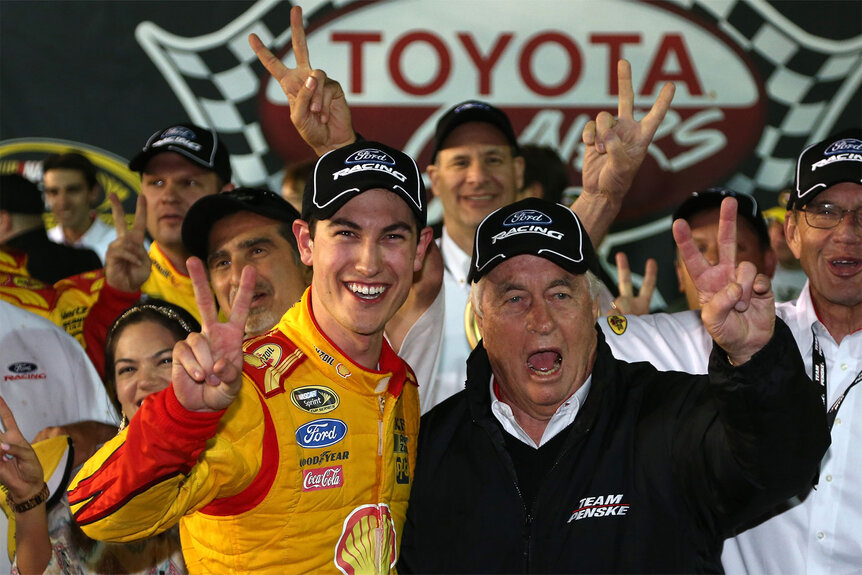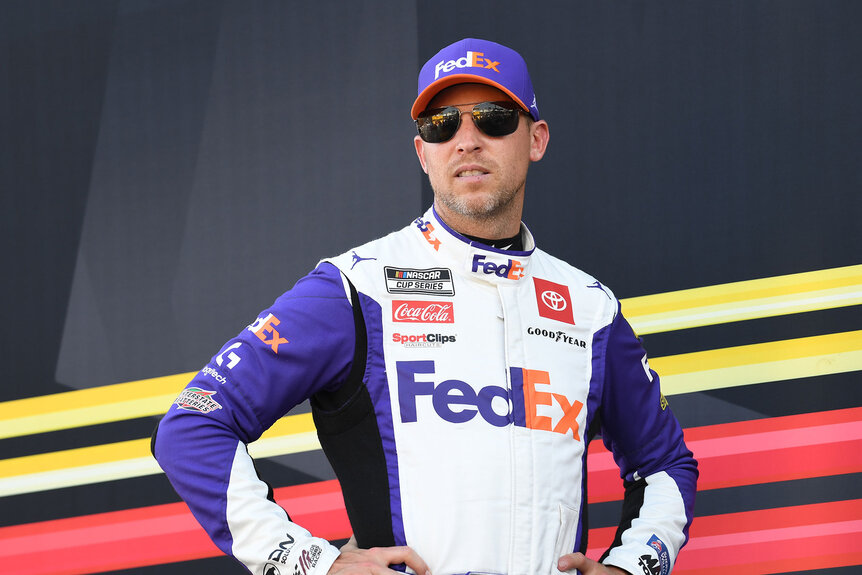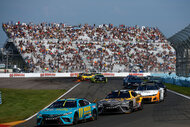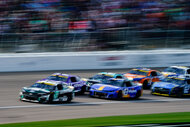Roger Penske Has Some Interesting Thoughts on the Future of NASCAR
The motorsports mogul has a unique vision that would see NASCAR become a much “cleaner” league.
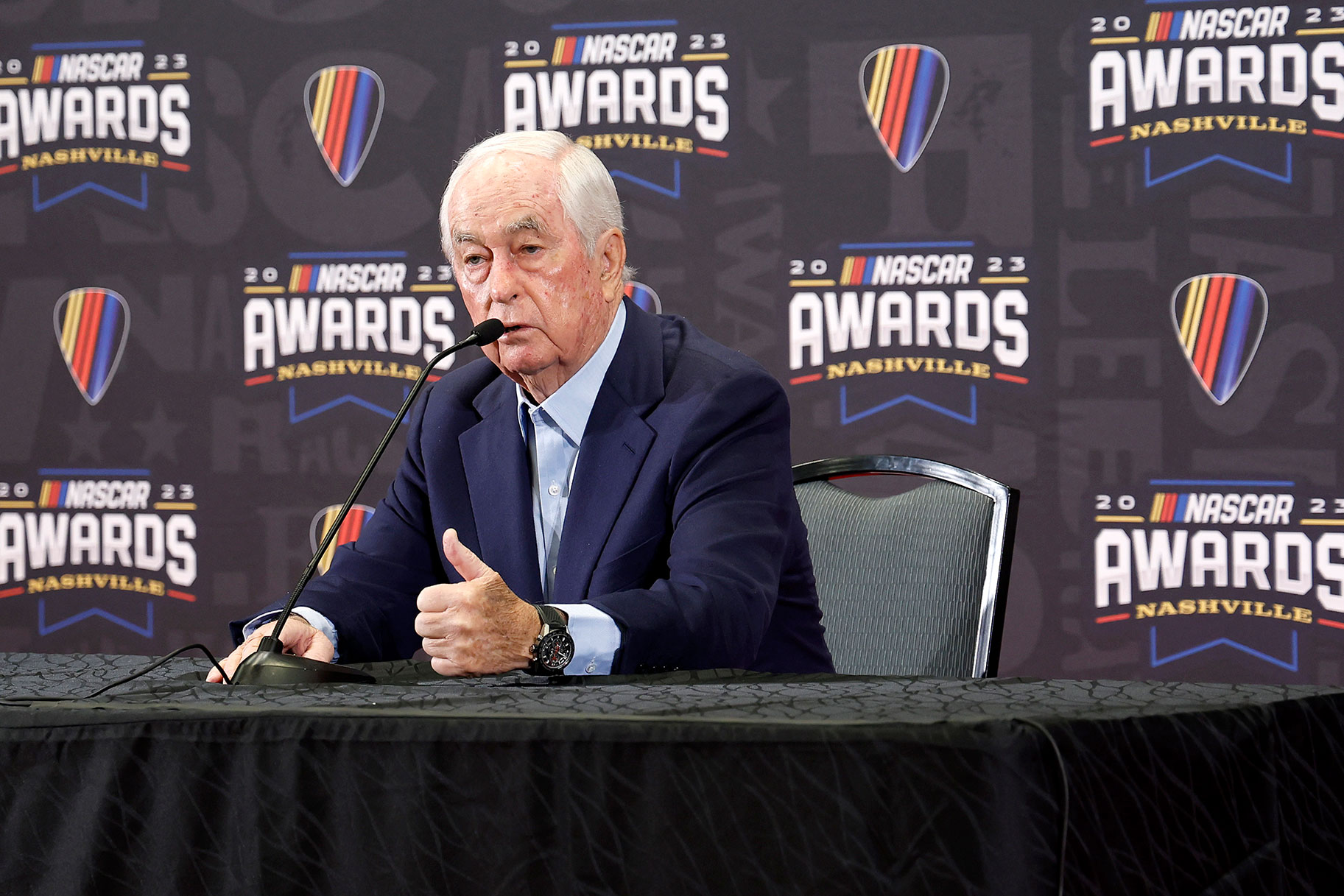
Championship-winning Cup Series owner Roger Penske — who built his multi-billion-dollar empire off mega fleets of gas-guzzling rental trucks and automotive dealerships — sees a path forward for NASCAR to reduce the league’s carbon. For Penske, that type of much-needed evolution always boils down to implementing and executing the right kind of strategy.
What did Roger Penske say about the future of NASCAR?
“I think the hybrid formula seems to be something that will make a lot of sense as we go forward because we’ve been seeing electrification kind of slow down here lately,” Penske said in an Autoweek story out Monday, of the possibility of hybrid vehicles taking part in NASCAR’s Cup Series in the future. “I think hybrid is more of a bridging strategy to the future.”
This isn’t the first time that the 86-year-old has leaned into the science of cleaner energy sources. Penske also owns the NTT IndyCar Series, which revealed that its new 2.2-liter twin-turbocharged hybrid V-6 engine would make its inaugural drive during the second half of the 2024 season. Penske took further steps to integrate renewable energy sources into his league’s infrastructure.
“All the trucks and trailers that go to IndyCar races are using renewable diesel [fuel)],” noted Penske, who's won NASCAR Cup Series championships with Joey Logano and Ryan Blaney. “We put that in this past year.”
While NASCAR does like to flex its engineering muscles, the league has traditionally leaned into evolving the mechanics of the car itself with the latest Next Gen iterations of the Ford Mustang and Toyota Camry. Sleek designs with beguiling craftsmanship and flashy feats of aerodynamic strength are one thing, but changing the fuel source in an era when drivers demand and rely on explosive speed is an entirely different concept.
Though there will be challenges in the road ahead, Penske realizes that a compromise of “some electrical components” paired with “a nice engine” will help gradually usher in a cleaner future for NASCAR.
RELATED: Hendrick Motorsports Garage 56 Chevy Outpaces Ferrari’s Le Mans Hypercar to Win Illustrious Award
“I think that’s what we’re going to see,” added Penske. “I don’t see it overnight, but you maybe could have a sedan series where they could run without fully electric vehicles.”
One thing standing in the way, according to Penske, is the rollout of the requisite infrastructure that electric vehicles (EVs) would rely on.
“Engine manufacturers or the OEMs are now dealing with our own strategies of trying to develop this EV marketplace, which is slower than expected,” Penske continued to Autoweek. “We have an issue of the reliability of the charging network, the infrastructure is not there, range anxieties. Remember with Formula E they had to come in and get in another car. If we had to bring two cars to a NASCAR race, I’m not sure that’s what we want to do right now if we’re trying to look at costs, but I think it’s in the future. I think the hybrid version could be very good.”
Penske’s vision of NASCAR’s energy source consumption extends further than just hybrids and EVs. After being impressed with Toyota’s and Hyundai’s strides in the realm of producing hydrogen cars, Penske sees that as a goal, but he warns that it will take a while before we see them in any competitive races.
RELATED: Who Does Ryan Blaney See as His Chief NASCAR Rival?
“I think that’s an opportunity,” Penske said. “We’ve looked at it in our [Penske Truck Rental] truck fleet. We’ve run some just as test units, but it’s going to be a long time before we see that in competition. I think you’re gonna have some modified different engines, and you’ll have some hybrids that will lean towards sustainability.”
As a leader in the NASCAR Cup Series community, owner and driver Denny Hamlin believes the responsibility of shifting the league toward a cleaner, more renewable future relies on the OEMs, which are the original equipment manufacturers that make the vehicle parts.
“You’ve got OEMs, that frankly, aren’t even aligned on what they believe the future is, whether it’s all lithium battery or is it some sort of mixture with hydrogen,” said Hamlin, according to Autoweek. “I think it’s going to take a while for this to play out, and it’s going to take years to play out to figure out where transportation in general in the U.S. goes and throughout the world.”
“NASCAR at times needs to put their foot down and say this is what we need to do for competition sake, but the OEMs have got to continue to have a voice because they are the ones who keep this thing afloat from a return perspective of selling street cars.”
